- Home
- Michael Crichton
Venom Business Page 2
Venom Business Read online
Page 2
“That’s it,” he said.
“Snakes must pay well,” she said.
“They do, they do.”
She lit a cigarette and said, “Why did you ask me to come to the party?”
“Because you saved my life.”
“I didn’t.”
“You did.” He laughed. “Besides, you’re very pretty. Have you got a dress, or do you want to buy one?”
“I have a black cocktail thing,” she said. “It’s mildly indecent.”
“Perfect,” Raynaud said. “The German ambassador is a dirty old man.”
She looked out at the jungle. “But I don’t have a hotel reservation,” she said.
“You don’t need one,” he said.
The house was located in the Marjunas suburb of Mexico City, a modern, almost futuristic area of lava fields, the houses blending into the stark landscape. Raynaud’s house had a pool and fountains in front, a lush garden in back. The house itself was glass and steel, harshly simple.
She looked at the living room, the Barcelona chairs and the native rugs, the careful use of heavy Spanish furniture, the white walls.
“Snakes may pay well,” she said, “but not this well.”
“You’d be surprised,” he said.
His housekeeper, Margarita, a severe-looking woman of fifty, greeted them. She looked with distaste at Jane. “Will you have dinner, sir?”
“After the reception.”
“For one?”
“For two.”
When they were alone in the living room, Jane flopped onto a chair. “I’m exhausted.”
“Drink first. There’s plenty of time. The reception isn’t until seven. What will you have?”
“Scotch on the rocks.”
“Water?”
“No.”
He mixed two scotches. She was still wearing her boots and slacks and a man’s shirt. She watched as he made drinks, and said, “I have a feeling about you.”
“Oh?”
“Yes. I have a feeling that you are a liar.”
He laughed. “I am.”
“I mean, a good liar. A professional.”
“I am. But I have a feeling about you, too.”
“Oh?”
He gave her the drink. “I think,” he said, “that you are running away, and not just from New York.”
“His name was George,” she said. “Does that explain anything?”
“Georges are awful,” he said. They clicked glasses. Reddish afternoon sunlight streamed into the living room. “Would you like the guest room,” he said, “or the master bedroom?”
“Which is preferable?”
“The master bedroom.”
“Does it include the master?”
“Generally speaking,” Raynaud said, “it does.”
She looked at him steadily over her glass. “You were right about one thing,” she said.
“What’s that?”
“You’re not very romantic.”
He laughed. “No, I suppose I’m not.”
“I think I would like a cold shower,” she said, standing up. “I feel grubby.”
“There’s something better.”
“Yes?”
He nodded to the outside. “The pool.”
“I didn’t bring a suit.”
“Doesn’t matter.”
“It does to me.”
“I mean,” he said, “that I stock a supply.”
He stood by the side of the pool in the fading light and; watched as she swam. He toweled himself dry and sipped the scotch and smiled as she turned at the poolside, and swam back in long, easy strokes. She had chosen the smallest bikini, a yellow one with red trim, and she wore it with grace and quiet confidence. She also didn’t mind getting her hair wet: he disliked women who paddled about with their heads above the water.
He sat down in a deck chair and watched as she got out of the water and wrapped a towel around her. She sat next to him and said, “It feels marvelous. Stop staring.”
“Wasn’t.”
“I have to lose three pounds.”
“Where?”
She picked up her drink and combed her wet hair. As if suddenly remembering, she said, “How will I ever dry it? There won’t be time.”
“I have a hairdryer.”
She paused then, and looked at him. “You come fully equipped.”
“Just the usual,” he said.
She sat back in the chair, closed her eyes, and faced the sun. “This is marvelous,” she said. “I could stay here forever.”
“You’re invited.”
Without opening her eyes: “Thanks anyway.”
“Really,” he said. “I’m going away on business. You’ll have the house to yourself. You might as well stay.”
“I couldn’t.”
“You certainly could.”
She picked up her drink. “Where are you going?”
“To London. There’s a convention of herpetologists.”
She smiled.
“Is that funny?”
“No. It’s just that I have to go to London as well.”
“Oh?”
“On business,” she said.
“I thought you were traveling around the world.”
“Yes. But I have to stop in London.” She looked at him. “When are you leaving?”
Feeling strangely guilty, he said, “Tomorrow morning.”
She paused and sipped the drink, then set it down on the glass poolside table.
“I could go with you,” she said.
“No.”
“All right,” she said quickly.
“I have to go to Paris first,” he explained.
“Oh,” she said. “I don’t like Paris much.”
“Neither do I.”
She seemed depressed for a moment, then smiled. “Well, perhaps we’ll meet in London.”
“Yes.” he said. “Perhaps we will.”
“The Bronx,” he said, standing in front of the mirror and tying his black silk tie. He looked at her reflected image as she stood in the doorway, watching him. She wore a black silk dress that was as scandalous as she promised: cut high to the hip and low over her breasts. “The Bronx. Ever been?”
“I’ve lived in New York.”
“East Side, I bet.”
She smiled. “Off and on.”
He adjusted the ruffles of his shirt and shrugged into the dinner jacket. “Well, I was raised on the rough side of the Bronx.”
“What made you decide to come to Mexico?”
He buttoned the jacket. “I went to Yale for a while. Six months, to be exact. Then I…left. Joined the Army. The Army discovered I was good at languages. They sent me to Monterey.”
“But now you’re going to the German Embassy reception.”
“Yes. In Mexico, they think I am amusing. I had an aunt in Columbus who left me some money. Nobody knew she had it until she died.” He laughed. “My parents were furious.”
“That was how you started your business?”
“More or less.”
He pulled his sleeves and adjusted the cufflinks. Then he turned away from the mirror.
“Shall we go?”
“You look quite foppish.”
“An act,” he said, taking her arm. They walked out of the bedroom to the living room. There he paused.
“Wait a bit. Forgot my cigarettes.”
He left her and walked back to the bedroom. There he paused to look through the door; she was standing in the living room, admiring a Spanish chest, running her fingers over the carved surface.
He went to the bedroom dresser, took out the revolver, broke it open, and counted the shells. Then he jammed it into his belt.
He returned to the living room a moment later. “All set.”
As they went to the door, she said, “You know, I don’t believe you left your cigarettes behind at all. I think it was something else.”
“Oh? Why?”
“Because there were three p
acks of cigarettes on the bar.”
“Forgot they were there.”
“Not likely,” she said.
They walked down the steps cut into the lava to the garage.
The butler, dressed stiffly in white tie and tails, opened the door for Jane Mitchell and helped her out of the gray Imperial convertible. “Good evening, Madam,” he said. “Good evening, Mr. Raynaud.”
“Good evening, Luis.”
“They are gathering upstairs, sir.”
“Thank you.”
Luis opened the door to the mansion and they entered the marble lobby. A curved staircase led up to the second floor; they heard the tinkle of glasses and laughter. As they walked up, Jane said, “Very impressive.”
“The Germans are trying hard in Mexico. Making up for lost time.”
“Or lost rebellions,” she said.
At the head of the stairs, the man inquired after their names and announced loudly, “Señorita Mitchell and Señor Raynaud.”
They moved down the receiving line.
“Charles,” said the first in line, Mrs. Burkheit. “You have brought another beauty with you. Wherever do you find them?”
“In the bush,” Raynaud said.
“Charmed,” Mrs. Burkheit said.
“Delighted,” Jane said, extending a frosty hand.
“Do look after Charles,” Mrs. Burkheit said. “He is so unstable.”
“He seems to look after himself,” Jane said.
Charles smiled blandly.
The rest of the receiving line was the same: Mrs. Everson; Mrs. Spengler; Mr. Spengler; the wife of the Ambassador, Mrs. Kronkheit; and finally the ambassador himself.
“Delightful,” the ambassador said.
“Wonderful to see you again,” Raynaud said.
“She is quite delightful,” the ambassador said, looking down Jane’s dress.
“Thank you,” Jane said, giving him a small curtsy and a large look.
At the end of the receiving line, as was the custom, stood a man with a large tray of drinks. Jane took a glass of champagne and said, “You were right.”
“What?”
“He is a dirty old man.”
“You chose the dress,” Raynaud said.
“Still, he didn’t have to stare that way.”
“Anyone would stare.”
“You haven’t.”
“Yes, I have,” Raynaud said, staring.
“Stop it,” she said, sipping champagne.
“Only if you tell me your decision,” he said.
“About what?”
“About whether you want the master bedroom or the guest room.”
They moved out among the guests at the reception. Raynaud walked to a corner and stood near the wall. In a sudden movement Jane pressed up against him and then stepped, back, smiling.
“So,” she said.
“So?”
“You forgot cigarettes?”
“Yes.”
“You forgot the gun which is stuck in your belt,” she said. “I’d guess it is a thirty-eight Smith and Wesson.”
“You have a very sensitive stomach.”
“Trained.”
She looked at him and sipped champagne. “I don’t understand you,” she said. “You won’t take a gun snakehunting, but you take one to a diplomatic reception.”
“Actually, I have to leave soon.”
“Oh?”
“Yes. A brief departure. For half an hour or so.”
“Your business?”
“Yes.”
“Snakes?”
“Of course,” Raynaud said.
She stared at him evenly. “You’re lying,” she said.
“Of course.”
The butler came up. “Señor Raynaud, you have a telephone call.”
Raynaud moved away from her. “Excuse me for a while.”
“I don’t know anybody here.”
“They’ll introduce themselves. Don’t worry.” He moved off into the crowd. “Just watch out for the German ambassador. He’s a whipper.”
He moved to a corner and picked up the phone.
“Hello?”
“Señor Raynaud?” It was a deep and throaty voice.
“Speaking.”
“I am ready.”
“Fine.”
He was about to hang up when the voice said, “But señor…”
He paused. “Yes.”
“There is a small trouble.”
“Oh?”
“Our friend. He has made preparations.”
“Then we shall also make preparations,” Raynaud said, and hung up.
He went downstairs and ducked back into the shadows beneath the curving marble stairway. There, he withdrew a penknife from his pocket and flicked open the blade. Deftly, he stabbed the tip of his finger and squeezed it until it was bleeding profusely. He wrapped the finger in a handkerchief and made certain that the blood stained through the white cloth.
Then he went to see the downstairs butler, Luis.
“Señor Raynaud, you have hurt yourself.”
Raynaud shrugged. “A small cut. Broken glass.”
“But you must attend it.”
“No time,” Raynaud said. “Call a taxi.”
“There is a taxi outside, señor,” Luis said. “It will take but a moment. If you will come with me to the first-aid kit.”
Raynaud hesitated, then followed him. They walked down a hallway to a small bathroom. A kit hung on the wall. Luis opened it and took out a bandage.
“I can take care of it myself,” Raynaud said. “Just give me the tape.”
Luis looked doubtful. Raynaud took the tape.
“Really, it is nothing. Very small. I can take care of it in the taxi.”
“If you insist, señor…”
“I do.”
Raynaud dropped the tape in his pocket, and with his other hand gave Luis fifty pesos.
“Now let’s get a taxi.”
In the taxi he applied a small strip of tape to the cut and put the rest of the roll in his pocket. He directed the taxi to a garage in the poor, Valdente section of town. There he got out and went in, tipping the attendant. He climbed into a battered, dusty Chevrolet sedan, inserted a key, and drove off. He was tired, gripping the wheel tensely. He knew it was the job, and the strain that was coming. He did not like to think about it, but it hung at the back of his mind. It was a big risk, with so much money involved.
For a moment, he wondered what Jane Mitchell would say if she saw him now.
He drove for several minutes, deep into the slums south of the city. At length he parked across from a modern high-rise structure. It was brightly lighted and freshly painted, but the laundry hanging out from the balconies gave it a dismal, depressing air.
He drove past the apartment house slowly, peering out of the car window. Around the building, someone had attempted to grow grass and small bushes, but the ground was too dry for the plants to take hold; they were blighted and scruffy.
He looked closely.
He saw one, crouching back from the door.
Two: a second, pulled back into the corners and deep shadows to the right.
And there was probably a third somewhere. Because Miguel could afford a third man, and because he would know it was necessary to handle Raynaud.
Damn Miguel.
He drove around the block and parked his car. He paused, blinked his lights, and doused them. Then he waited. After a moment Rico came up and slipped quietly into the back seat.
“What have you seen?” Raynaud said.
“Three,” Rico said. “One in the front. Another to the side. A third upstairs.”
“No more?”
“No more,” Rico said.
“How long have you been watching?”
“Five hours, as you instructed,” Rico said. He smiled, showing white teeth in the dark. “You do not trust Miguel, eh?”
“I trust no one,” Raynaud said. “Not even you.”
Rico s
eemed to accept this; he nodded. “Miguel has a new woman. She is a beauty.”
“He cannot afford her.”
“So he cuts the corners, eh?”
“If he can.” Raynaud lit a cigarette and smoked in the silence. “Do you think they will try it before, or after?”
“After, I think.”
“Did you see guns?”
“No. No guns.”
Raynaud nodded, and puffed the cigarette. He stared at the apartment building. “You have done well, Rico.”
“Thank you, Señor Raul.”
“I shall go in now. If you hear gunshots, call the police. Understood?”
“Understood, Señor Raul.”
Raynaud got out. He stripped off his dinner jacket and slipped it into the trunk; then he took out a long serape. It looked absurd, the brightly colored material against his dark trousers with the stripe. But in a fast situation, no one would notice.
He started to walk away, and Rico called, “Señor, shall I have him killed?”
“No. Not yet.”
He moved forward toward the apartment house, watching the bushes from the corner of his eyes. Nothing moved. This, he knew, was the hardest part, to walk among the men as if he did not know they were there. But he had no choice; he must not alert Miguel. Otherwise all was lost.
Poor Miguel.
The last time Raynaud had visited the smuggler, he had noticed the woman. She was striking, a smoldering black-haired woman, but she was too expensive for Miguel. It was inevitable that he would try something like this.
Raynaud entered the building and took the elevator up to the ninth floor. His heart was pounding, thumping away inside his chest.
The elevator gave a musical chime and stopped. Raynaud walked down a long corridor to the door marked 12. He knocked, and stepped back.
Miguel answered, looking sleepy.
“Hello, Miguel.”
“Señor Foxwell. I thought you would never come, my friend.” Miguel smiled, stepped back, and gestured for Raynaud to enter.
The apartment inside was brightly lighted. Raynaud entered, his hand at his waist, beneath the serape.
“I am alone,” Miguel said in a hurt voice. “Except, of course, for the woman.”
“Of course.” Raynaud grinned. “You think I don’t trust you?”
“I know you don’t trust me,” Miguel said unhappily. He closed the door. “Brandy?”
“Small.”
“This is a very special brandy,” Miguel said. “Courvoisier.”
“Where did you get it?” Raynaud asked, sitting down. He tried to appear casual; he knew it was important.

 Dragon Teeth
Dragon Teeth Jurassic Park
Jurassic Park Micro
Micro The Great Train Robbery
The Great Train Robbery The Andromeda Strain
The Andromeda Strain The Lost World
The Lost World Congo
Congo Travels
Travels Timeline
Timeline Sphere
Sphere Westworld
Westworld Prey
Prey State Of Fear
State Of Fear Next
Next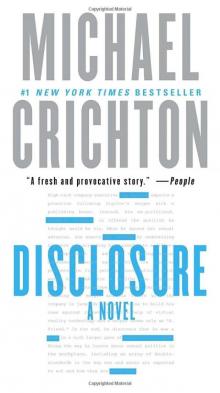 Disclosure
Disclosure Pirate Latitudes
Pirate Latitudes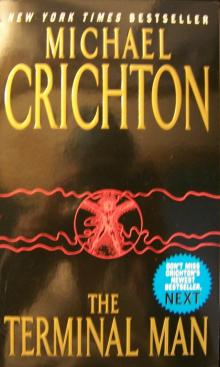 The Terminal Man
The Terminal Man Five Patients
Five Patients Rising Sun
Rising Sun Binary
Binary The Andromeda Evolution
The Andromeda Evolution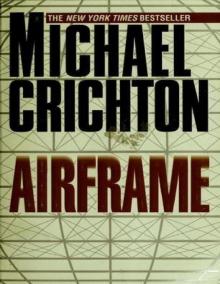 Airframe
Airframe Easy Go
Easy Go Drug of Choice
Drug of Choice Odds On: A Novel
Odds On: A Novel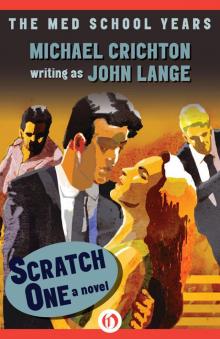 Scratch One
Scratch One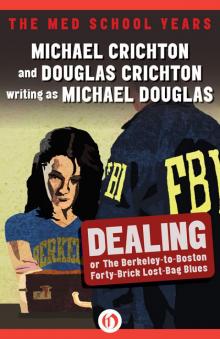 Dealing or The Berkeley-to-Boston Forty-Brick Lost-Bag Blues
Dealing or The Berkeley-to-Boston Forty-Brick Lost-Bag Blues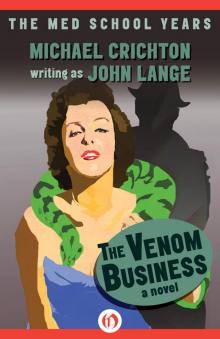 Venom Business
Venom Business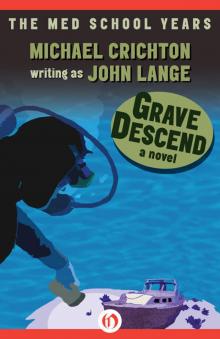 Grave Descend
Grave Descend Gold - Pirate Latitudes
Gold - Pirate Latitudes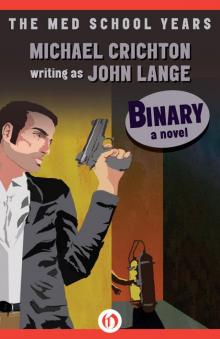 Binary: A Novel
Binary: A Novel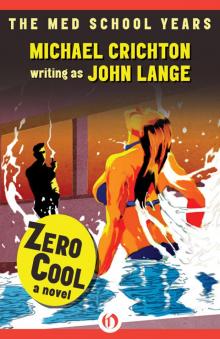 Zero Cool
Zero Cool Delos 1 - Westworld
Delos 1 - Westworld